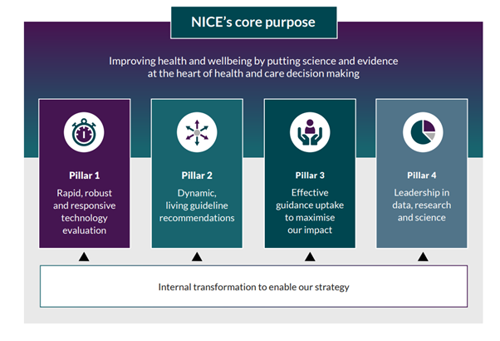The NHS are aware their data analytic efforts need improving as ‘better use of data’ is an integral part of their Long-Term Plan. [1] This plan sets out aspirations to develop their healthcare service to ensure the NHS is fit for the future and adapts to changing health and society needs over the next ten years. Having a basic level of data literacy also became a requisite in the NHS Standard Contract from 2019-2020. [2] Thus, a proportion of healthcare providers’ income is seemingly conditional on improving data standards. Through the CQUIN (Commissioning for Quality and Innovation) framework, improvements in the quality of services and the creation of new, improved patterns of care are laid out and there are new indicators supporting improvement since the contractual obligation. [3]
In June 2022 the NHS published ‘Data Saves Lives: Reshaping Health and Social Care with Data’. Given their current data strategy lacked alignment amongst the 217 trusts, a more coherent approach was needed on a national level. The desire to keep pace with the modern day was also emphasized when, the Health and Social Care Secretary at the time, Sajid Javid, claimed: “We are embarking on a radical programme of reform that will make sure the NHS is set up to meet the challenges of 2048-not 1948, when it was first established”.[4] The NHS needs to undergo a radical programme of reform to modernise its use of data and technology, and to adapt to the changing needs and expectations of the future population. It’s also implied if the necessary changes aren’t made, the state of the NHS will be closer to a nationalised health service set up in post-war Britain rather than one fit for the 21st century.

As we surpass the first anniversary of the policy paper it's important to note the weight given to the cultural change in how data is used is viewed as important as technical changes to “unlock the incredible power that data possesses”.[5] The document outlined how data should be progressed and better managed within the NHS, creating a single coherent data strategy resting on the integrity that data must be impactful and effective. Data Saves Lives was well received with 85% agreeing with the vision statement that the plan gave new value to NHS data.[6]
The strategy is made up of seven principles. The hope being it would harness data driven power and innovation to drive transformation in health and care, creating a secure and privacy preserving system that delivers for patients and professionals alike.
The 7 Principles Are:
- Improving trust in the health and care system’s use of data: Guaranteeing that data is used in a safe, secure, and ethical way, respecting the privacy and preferences of patients and the public. The NHS must be transparent and accountable about the data it collects stores, accesses, and uses, and give service users more control over their own data.
- Giving health and care professionals the information they need to provide the best care: Ensuring that data is accurate, complete, timely, and consistent across the system and that it can be easily accessed and shared by those who need it to deliver high-quality care. The NHS pledge to empower staff with the skills, tools, and support they need to use data effectively and efficiently.
- Improving data for adult social care: Collecting data and using it in a way that reflects the needs, experiences, and outcomes of people who use social care services, as well as their carers and families. Improving the integration of data across health and social care and supporting the digital transformation of social care provision is a promised priority.
- Supporting local decision-makers with data: Being vigilant that good data is available and accessible to inform the planning, commissioning, and delivery of health and care services at a local level. The NHS is putting in place support enabling local leaders to use data to identify gaps, challenges, and opportunities within the service offering to make marked improvements and to follow through with the skills required to monitor and evaluate the impact of their decisions.
- Empowering researchers with the data they need to develop life-changing treatments and diagnostics: Providing data to researchers in a secure and ethical way, enabling them to conduct high-quality research that can lead to innovations or solutions that weren’t previously considered for health and care challenges. For this to take place, the NHS will foster a culture of collaboration and co-creation between researchers, clinicians, patients, and the public alike to ensure innovation can thrive.
- Working with partners to develop innovations that improve health and care: Setting up data so it’s used to support the development and adoption of new technologies, products, and services that can enhance health and care delivery and outcomes. The NHS plan to create an environment that enables innovation, by providing clear guidance, standards, regulation, and incentives for data-driven solutions.
- Developing the right technical infrastructure: Organising data efficiently so it is stored, processed, and transmitted in a secure, reliable, scalable, and interoperable way with the management of modern standards and architectures. The NHS will invest in the infrastructure, systems, platforms, and networks that are needed to support the effective use of data across the health and care system.

The feedback on the ‘Data Saves Lives’ applauded the ambitious and good sense of direction of the policy paper yet given the complexity of the system and existing fragment technology, the timescale does seem overly optimistic and didn’t consider the existing barriers. In June 2022, 100 + commitments were established to encourage better use of data, and a year later over 50% of them have been delivered, although most of these are in the foundation stage, it has nevertheless built stability and promoted success for the delivery stage going forward [7]
NICE (National Institute for Health and Care Excellence) isa public body that provides national guidance and advice to improve health and social care in the UKT. The NICE strategy (2021-2026) anticipates potential future changes and challenges to the healthcare ecosystem. [8] Their principal idea states that health and well-being can only be improved if we put science and evidence at the heart of decision-making. Their fourth pillar recognises the importance of “leadership in data, research and science”. Thus, to drive the research agenda, it’s vital to have excellent guidance and directions from management to resolve the gaps in knowledge and drive innovations. The NHS have looked at supporting local and national decision makers with data. The vision being leaders and policymakers in every community will have up to date sophisticated data to make effective decisions and help the health and care system run at its best. They will be supported in improving their data literacy and building analytical, management and engineering capabilities. It will encourage data skills in national and local government, across the whole health and care workforce, and make sure data and analytics expertise is represented at the board level to improve the data analytics ecosystem. With this collaboration and capabilities, staff will feel empowered to use the data they need to develop life changing treatments, diagnostics, models of care and insights.

£25 million has been announced for the rapid digitalisation of social care to meet the commitment for at least 80% of social care providers to have digitised care records in place by March 2024. Millions of people will benefit from faster, more innovative treatment and diagnosis by reducing the reliance on paper documents alone There was also £200 million investment into TREs (trusted research environments) established to better enable researchers to securely access linked NHS. Thus, funds are being put forward to create a more data centric NHS.
The NHS have streamlined the data responsibility and its accompanying transformative power into NHS England, transferring the functions that were once shared with NHS Digital, which will in turn support ICS delivery. Each ICS now has a shared care record in place, allowing key information to flow and be shared between different GP practices and NHS Trusts. To quote Sir John Bell (professor of medicine at Oxford University) “We have some of the best data in the world, but it needs integration across all aspects of care to provide real benefits for patients and for the NHS”
To conclude, there has been a key NHS document homing in on the importance of data and is supported by other literature and the operations of NICE. This includes setting out a comprehensive roadmap across the system to ensure everyone can participate in making data more accessible, improve cooperation and provides the strong national leadership needed to ensure data is analysed effectively within the healthcare system.
[1] NHS England (2019) NHS Long Term Plan, NHS. Available at: https://www.longtermplan.nhs.uk/.
[2] Department of Health and Social Care (2021) Putting data, digital and tech at the heart of transforming the NHS. Available at: https://www.gov.uk/government/news/putting-data-digital-and-tech-at-the-heart-of-transforming-the-nhs(Accessed: 23 July 2023)
[3] Our delivery directorates: 2. Data, Insights and Statistics. NHS Digital. Available at: https://digital.nhs.uk/about-nhs-digital/corporate-information-and-documents/nhs-digital-s-annual-reports-and-accounts/annual-report-and-accounts-2018-19/2.-data-insight-and-statistics (Accessed: 02 August 2023).
[4] Department for Digital, Culture, Media & Sport and The Rt Hon Oliver Dowden MP (2020) New data strategy to drive innovation and improve efficiency. [Press release]. Available at: https://www.gov.uk/government/news/new-data-strategy-to-drive-innovation-and-improve-efficiency (Accessed: 23 July 2023)
[5] Department for Digital, Culture, Media & Sport and The Rt Hon Oliver Dowden MP (2020) New data strategy to drive innovation and improve efficiency. [Press release]. Available at: https://www.gov.uk/government/news/new-data-strategy-to-drive-innovation-and-improve-efficiency (Accessed: 23 July 2023)
[6] NHS England» Data Saves Lives – one year on. www.england.nhs.uk. Available at: https://www.england.nhs.uk/blog/data-saves-lives-one-year-on/ (Accessed: 03 August 2023).
[7] NHS England» Data Saves Lives – one year on. www.england.nhs.uk. Available at: https://www.england.nhs.uk/blog/data-saves-lives-one-year-on/ (Accessed: 03 August 2023).
[8] NICE.. The NICE strategy 2021 to 2026 | Corporate publications | Who we are | About. [online] Available at: https://www.nice.org.uk/about/who-we-are/corporate-publications/the-nice-strategy-2021-to-2026.
Written By Charlie Dawson
